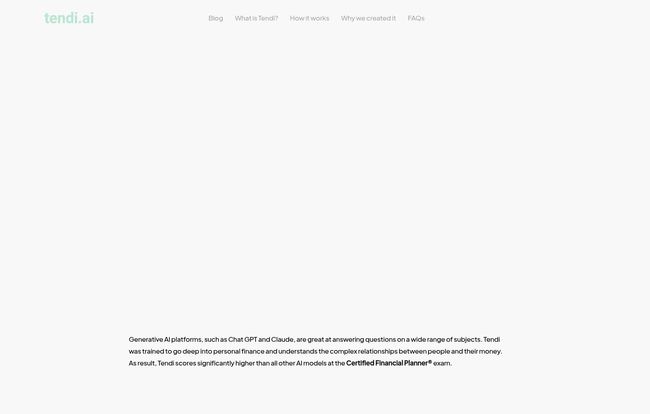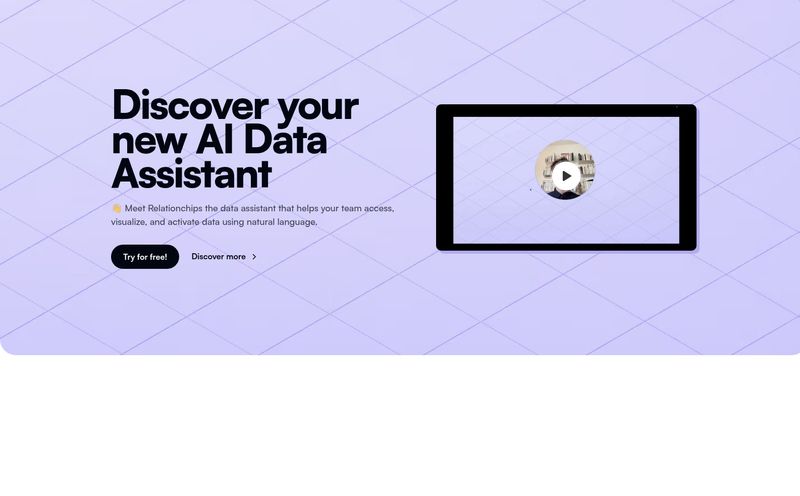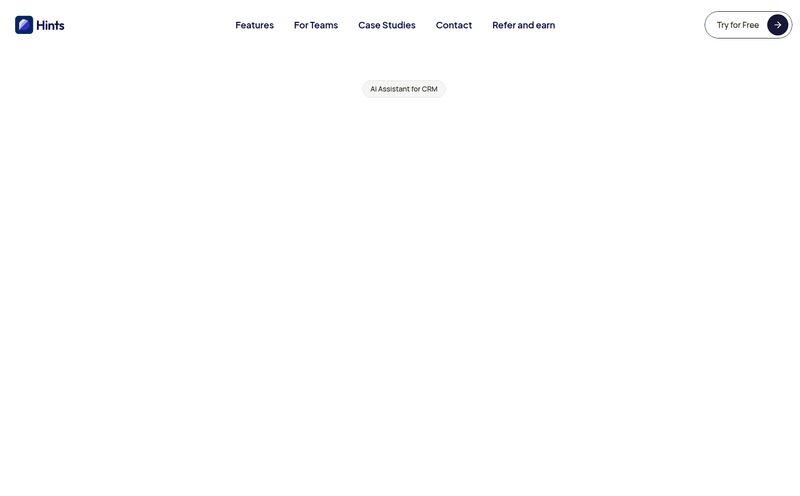Managing money can feel like you're constantly trying to plug a dozen holes in a sinking boat with only two hands. You've got your checking account over here, a credit card there, maybe a savings account collecting digital dust, and a retirement fund you're afraid to even look at. Every year, a new wave of fintech apps hits the market, all promising to be the silver bullet for our financial woes. Most of them are just glorified calculators with prettier charts.
So, when I came across Tendi.ai, my first reaction was a healthy dose of SEO-blogger skepticism. Another one? Really? But something about its pitch caught my eye. It’s not just about tracking where your money went. It claims to be an AI-powered personal financial advisor, focused on understanding, planning, and actually improving your financial situation. A big claim. So, naturally, I had to take a look and see if it’s all sizzle and no steak.
So, What Exactly Is Tendi.ai?
At its core, Tendi.ai is a platform designed to be a personal trainer for your wallet. Instead of just showing you a pie chart of your spending (thanks, I already know I have a coffee problem), it connects to your financial accounts to get a full 360-degree view of your money. We're talking about connecting to over 12,000 financial institutions, which is pretty comprehensive. This allows its AI to analyze your habits, income, and debt not as separate pieces, but as one interconnected system.
Think of it like this: most budgeting apps are like a bathroom scale. They tell you a number, but not what to do about it. Tendi aims to be the nutritionist and personal trainer who sees the number on the scale, looks at what you’re eating, and then gives you a concrete workout and meal plan. It’s all about providing actionable strategies for managing debt, saving more effectively, and even dipping your toes into investing.

Visit Tendi
The Financial Health Index (FHI): Your Financial Report Card
Okay, this is where I think Tendi might have something special. One of its standout features is the Financial Health Index (FHI). We all know our credit score, right? It’s that three-digit number that dictates our lives. Well, the FHI is kind of like that, but for your entire financial well-being. It’s a single, easy-to-understand score that measures how you're doing with spending, saving, borrowing, and planning.
I love this idea. Why? Because seeing a bank balance of $2,000 doesn't tell you much. Is that good? Bad? Depends on your income, your debts, your goals. An FHI score gives you immediate context. It tells you where you stand and, more importantly, helps track your progress over time as you follow the app’s advice. It turns the vague goal of “getting better with money” into a measurable mission.
The Good Stuff: What I'm Genuinely Excited About
After looking through its features, a few things really stand out. First is the promise of truly personalized advice. The AI isn't just regurgitating generic tips you could find on any blog (ahem). It's supposed to look at your specific habits and say, "Hey, we noticed you could save an extra $75 a month by adjusting this one subscription and rounding up your purchases." That's a game-changer for people who feel lost and need a clear, tailored starting point.
The holistic approach is another huge plus. Trying to manage your finances with data from three different apps and a clunky spreadsheet is a nightmare. By securely integrating with all your accounts, Tendi gives you—and its AI—the complete picture. This is crucial for bridging the financial literacy gap. It simplifies the complex and makes it manageable.
Let's Be Real: The Potential Sticking Points
Now, it can't all be sunshine and rainbows. As with any financial tool, there are trade-offs. The most obvious one is the data dilemma. To get the most out of Tendi, you have to connect your bank accounts. For many, that's a huge psychological hurdle. We've all been taught to guard our banking info with our lives. While Tendi emphasizes secure bank integration (using services like Plaid, I'd assume, which is industry standard), it’s a level of trust you have to be comfortable with. It's the same trade-off we make for convenience with countless other apps, but with money, the stakes just feel higher.
Another point is that the tool's effectiveness is entirely dependent on the data it's given. If you have accounts you don’t link or your data is messy, the AI’s advice will be skewed. It's a classic case of "garbage in, garbage out." And finally, there's the mention of premium features requiring a subscription. We’ll get to that next.
So Who Is This Actually For?
I don't think Tendi is for everyone, and that's okay. I see it being incredibly valuable for a few specific groups:
- The Financial Novice: If you're just starting out, feeling completely overwhelmed by terms like 'asset allocation' and 'debt-to-income ratio,' this could be your guide. It holds your hand and provides a clear path.
- The "I'm Doing Okay, But..." Crowd: You save a little, you pay your bills on time, but you know you could be doing better. You lack a clear strategy to optimize your finances. Tendi could provide that data-driven nudge to take you from good to great.
- The Visually-Oriented Planner: If you're someone who gets motivated by seeing a score increase or tracking tangible progress, the FHI could be a powerful motivator.
Who might want to skip it? The hardcore DIY investor who lives in spreadsheets and already has a complex system they love. Or, the extremely privacy-focused individual who, understandably, won't link their accounts to any third-party service, no matter teh security.
The Million-Dollar Question: What Does Tendi.ai Cost?
Here’s the tricky part. If you go looking for a pricing page on their site right now, you’ll hit a 404 error. Frustrating, right? But the homepage gives us a clue: it's currently promoting an "early access" sign-up.
This tells me Tendi is likely in a beta or pre-launch phase. My educated guess? They’ll probably operate on a freemium model, similar to how Mint used to work or how Empower Personal Dashboard does. This would mean a free version with core features like the FHI and spending analysis, and a premium subscription that unlocks more advanced AI coaching, personalized challenges, and deeper insights. For early adopters, this could mean a chance to get in on the ground floor, maybe even with a lifetime deal or a heavy discount. It's a bit of a gamble, but one that could pay off.
Compared to a tool like YNAB (You Need A Budget), which has a very strict, hands-on philosophy and a subscription fee, Tendi seems to be positioning itself as a more automated, hands-off "advisor." It's less about you assigning every dollar a job and more about an AI co-pilot making suggestions for you.
A Promising New Contender in a Crowded Field
So, what’s the verdict? I’m cautiously optimistic. I’ve seen dozens of finance apps, and many fall flat. But Tendi.ai’s focus on a holistic Financial Health Index and actionable AI-driven advice is a genuinely interesting take. It moves beyond simple tracking and into the realm of actual coaching.
The success of Tendi will ultimately hinge on two things: earning user trust with rock-solid security and proving that its AI can deliver insights that are genuinely more valuable than the generic advice we can all Google for free. If it can nail those two things, it might just be the financial guru a lot of people have been waiting for. I, for one, will be keeping a close eye on it.
Frequently Asked Questions about Tendi.ai
- Is Tendi.ai safe to connect to my bank accounts?
- Tendi states that it uses secure bank integration. Most modern fintech apps use trusted third-party services like Plaid to handle these connections, which use encryption and are 'read-only,' meaning the app can't move your money. You should always review the privacy policy, but it's built on modern security standards.
- How will Tendi.ai make money if it's free to sign up for early access?
- While there's no official pricing yet, the model is likely to be freemium. This means a free version with essential features and a paid premium tier for advanced AI coaching, customized plans, and other powerful tools. Early access often comes with perks for the first users.
- What is the Financial Health Index (FHI) in simple terms?
- Think of it as a credit score for your overall financial life. It's a single number that summarizes how well you are managing your spending, savings, and debt, giving you a quick and easy way to understand your financial standing and track your progress.
- Is Tendi.ai a robo-advisor for investing?
- Not exactly. While it offers strategies for saving and investing, its primary focus seems to be on your overall financial habits and planning rather than specific stock or fund recommendations. It helps you build the foundation (like finding money to invest) rather than picking the investments for you.
- Do I absolutely have to connect my bank account to use Tendi?
- To get the full benefit of the personalized AI insights and the FHI calculation, yes, you'll need to connect your accounts. Without that data, the platform can't provide an accurate analysis of your financial health. You could likely use some features manually, but it would defeat its main purpose.



